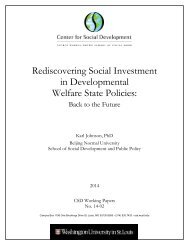Exploring and Assessing Intercultural Competence - Center for ...
Exploring and Assessing Intercultural Competence - Center for ...
Exploring and Assessing Intercultural Competence - Center for ...
Create successful ePaper yourself
Turn your PDF publications into a flip-book with our unique Google optimized e-Paper software.
<strong>Exploring</strong> <strong>and</strong> <strong>Assessing</strong> <strong>Intercultural</strong> <strong>Competence</strong><br />
- impossible to immerse myself in the local culture with being able to speak<br />
- would probably have been ripped off all the time too<br />
(SA14)<br />
- host language very important<br />
- enables one to take part in conversations<br />
- improved to level of political discussions<br />
- important in order to communicate <strong>and</strong> to underst<strong>and</strong> people<br />
- otherwise nuances get lost<br />
- in contact with Quechua but didn’t learn it<br />
- people who did not speak Spanish were not integrated or were excluded from conversations<br />
- English sometimes used as a means of communication<br />
Summary<br />
For the plurilingual Swiss volunteers, learning the host tongue was assumed. Since all of them<br />
had already acquired three languages, learning a fourth was a natural (<strong>and</strong> perhaps easy)<br />
progression, in contrast with the monolingual British volunteers who were amazed that they<br />
could indeed learn <strong>and</strong> indeed communicate in another tongue (their first time). Given this<br />
background (<strong>and</strong> the insights typical of multilingual individuals), learning Spanish was expected<br />
<strong>and</strong> it is interesting that the Swiss volunteers focused their comments more on details of how they<br />
learned <strong>and</strong> of improving accent rather than marvel at their accomplishments. Overall, the Swiss<br />
volunteers achieved higher proficiency levels than their British counterparts (of whom only 2<br />
achieved levels of “structural accuracy”) while 5 of the Swiss volunteers exceeded this level.<br />
Aside from proficiency, all alumni gained important insights about the significance of being able<br />
to speak the host language <strong>and</strong> its relevance to their experience. Here’s what 6 British volunteers<br />
<strong>and</strong> 1 Swiss volunteer said in their own words during interviews (combined <strong>and</strong> consolidated<br />
where possible):<br />
(BV6+I) “Communication, which means not only to speak but also to listen <strong>and</strong> watch<br />
differences <strong>and</strong> characteristics . . . helped in many ways, especially with my family. At the<br />
beginning, I felt as a child because I wouldn’t underst<strong>and</strong> most things. This wouldn’t let me know<br />
how to react be<strong>for</strong>e many different situations that changed as I got more experienced in the<br />
language <strong>and</strong> culture. Learning of the host language helped me overcome this ambiguity.”<br />
- communication helped in many ways<br />
- helped to know how to react in different situations<br />
- learning host language helped overcome ambiguities<br />
(SV3+I) “(Language) important to have intercultural success. . . . It would have been impossible<br />
to per<strong>for</strong>m my duty without Spanish. . . . if I hadn’t been capable of communicating with (the<br />
kids I worked with), my work would have failed.”<br />
- important to intercultural success<br />
- impossible to per<strong>for</strong>m my duty without it<br />
- if not capable of communicating, my work would have failed<br />
-language is the key to everything, to communicating <strong>and</strong> underst<strong>and</strong>ing the local culture, to<br />
overall success (7)<br />
-it opened a new world of opportunities <strong>and</strong> experiences (1)<br />
-language was vital/very important to my success (7)<br />
<strong>Center</strong> <strong>for</strong> Social Development<br />
Washington University in St. Louis<br />
36
















